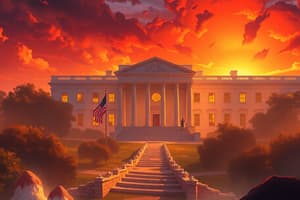Podcast
Questions and Answers
Which article of the Constitution outlines the Executive Branch's roles and responsibilities?
Which article of the Constitution outlines the Executive Branch's roles and responsibilities?
- Article II (correct)
- Article I
- Article IV
- Article III
What is the primary function of the Executive Branch in the U.S. government?
What is the primary function of the Executive Branch in the U.S. government?
- To interpret laws
- To create laws
- To enforce laws (correct)
- To declare laws unconstitutional
Which of the following is NOT a formal qualification to be President of the United States?
Which of the following is NOT a formal qualification to be President of the United States?
- Being a natural-born U.S. citizen
- Having lived in the U.S. for 14 years
- Having a law degree (correct)
- Being at least 35 years old
Which of the following correctly identifies one of the categories under which the President's duties are classified as the '4 Cs'?
Which of the following correctly identifies one of the categories under which the President's duties are classified as the '4 Cs'?
Who holds the authority to declare war within the U.S. government?
Who holds the authority to declare war within the U.S. government?
How long is the President authorized to act under the War Powers Act before needing to renew that authorization?
How long is the President authorized to act under the War Powers Act before needing to renew that authorization?
What action can a President take as the Chief Executive Officer?
What action can a President take as the Chief Executive Officer?
What was a concern of the Framers regarding the direct election of the President?
What was a concern of the Framers regarding the direct election of the President?
Flashcards
What is the primary responsibility of the Executive Branch?
What is the primary responsibility of the Executive Branch?
The branch of the U.S. government responsible for enforcing laws.
Who is the head of the Executive Branch?
Who is the head of the Executive Branch?
The President of the United States is the head of the Executive Branch.
What does 'Commander in Chief' mean?
What does 'Commander in Chief' mean?
The President is the Commander in Chief of the Armed Forces. This means they have the power to lead the military and order military actions.
Can the President send troops into combat without Congress's approval?
Can the President send troops into combat without Congress's approval?
Signup and view all the flashcards
What are some of the actions a President engages in as Chief Executive?
What are some of the actions a President engages in as Chief Executive?
Signup and view all the flashcards
What are some of the President's duties as Chief Diplomat?
What are some of the President's duties as Chief Diplomat?
Signup and view all the flashcards
What are some of the President's duties as Ceremonial Head of State?
What are some of the President's duties as Ceremonial Head of State?
Signup and view all the flashcards
Why were some Founding Fathers concerned about a directly elected President?
Why were some Founding Fathers concerned about a directly elected President?
Signup and view all the flashcards
Study Notes
Executive Branch Responsibilities
- The Constitution's Article II outlines the Executive Branch's roles and responsibilities.
- The Executive Branch's primary responsibility is to enforce laws.
- Formal presidential qualifications include being a natural-born citizen, at least 35 years old, and a 14-year resident.
Presidential Roles
- Chief Executive: Enforcing laws, using executive orders, making political appointments, and hosting the State of the Union address.
- Chief Diplomat: Negotiating treaties, trade agreements, peace pacts, and alliances with other countries. Meeting with world leaders.
- Commander in Chief: Leading the military, issuing military orders, and making decisions in times of war or threat.
- Ceremonial Head of State: Welcoming foreign dignitaries, recognizing citizens, and hosting celebrations.
Presidential Powers
- A president can use executive orders to direct actions within the executive branch.
- The War Powers Act limits a president's ability to use troops in combat operations without Congressional approval, granting a 60-day period needing extension.
- Presidents can send troops into combat operations, but congressional approval is not always required, and there are different ways to achieve this, like the War Powers Act.
Concerns about Presidential Elections
- Framers of the Constitution had concerns about direct election of the president due to concerns about democracy, preferring an indirect system.
Studying That Suits You
Use AI to generate personalized quizzes and flashcards to suit your learning preferences.
Related Documents
Description
Test your knowledge on the roles, responsibilities, and powers of the Executive Branch as outlined in Article II of the Constitution. This quiz covers presidential qualifications, roles as Chief Executive, Chief Diplomat, and Commander in Chief. Join now to understand how the Executive Branch functions in government.




